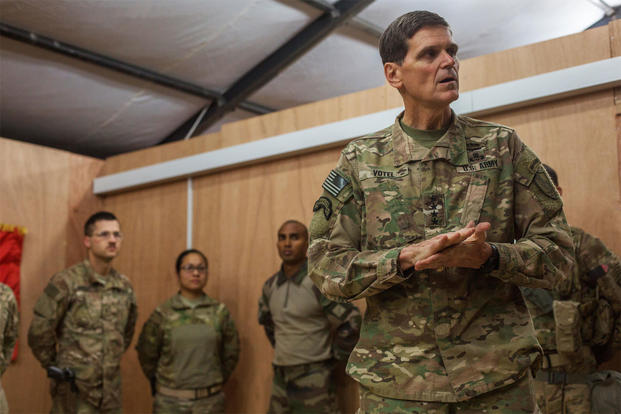The commander of U.S. Central Command said Wednesday he doesn't want American troop levels in Afghanistan to drop anytime soon -- and that the decision to keep more in country sent a "strong message."
Army Gen. Joseph Votel praised President Barack Obama's decision in July to keep American troop levels in Afghanistan at 8,400 instead of going down to 5,500.
"The decision to stay as opposed to going down to 5,500, which is where we would generally be right now, and keeping it at a much higher level -- around 8,400 -- I think was a very wise move," Votel told an audience at the Foreign Policy Initiative's 2016 forum, "An Era of Consequences."
"I think it sent a very strong message to the coalition; I certainly think it sent a strong message the Afghan forces and the people of Afghanistan … so I am very keen to keep that going into the future.
"I think Afghanistan is a country worth fighting for. As a military member who went with the first wave of forces in October 2001, I remain very hopeful about it."
The forum, held at the Newseum in Washington, D.C., focused on a number of topics ranging from the strategy to defeat the Islamic State of Iraq and Syria to broader challenges in the Middle East.
Votel also spoke about the current operation to recapture Mosul from ISIS forces.
"We are trying to present the Islamic state with a lot of dilemmas that they have to deal with simultaneously, and that strategy in very broad terms the military strategy is working," Votel said. "It is beginning to expose the cracks, and I think it is helping us with reducing the physical size of the caliphate."
In Mosul, Iraqi security forces working with the Kurdish regional government forces are on track but face a fight that will likely last into next year, Votel said.
"It will be a long fight in Mosul," Votel said. "This is a huge, huge urban area, and the Islamic State has had a couple of years to prepare their defenses, so it is not going to be a cakewalk."
Votel said he didn't want to speculate on a timeframe but said the operation could take "a couple more months."
"The Islamic state is fighting hard right now, but again I think you have to look at the wear and tear that they are absorbing with this – the continued strikes, the continued pressure we are putting on them, the inability to move forces … ultimately I think that will have an accelerated effect and allow us to move a little bit faster," Votel said.
"But I am not in the business of giving dates, we are going to move at the pace of our partners."
Votel also talked about his concerns about the Joint Comprehensive Plan of Action with Iran, commonly known as the Iran nuclear deal.
"It's not necessarily my job to monitor that, but I think that it is being implemented appropriately and I think it has addressed one of the threats we need to be concerned about," Votel said.
"The bigger concern for me is that the JCPOA has not has not really changed Iranian behavior; it certainly hasn't changed the regime's behavior in terms of the things they are doing."
President-Elect Trump criticized the Iran deal while campaigning and threatened to walk away from it if elected.
"The other concerns that we have about the broader Iranian threat problem remain – whether it's their cyber activity, whether it's their use of surrogates, whether it's their facilitation of lethal aid whether it's their buildup of missile capability and other anti-access capabilities in the region or whether it's their unprofessional and aggressive activities in the Persian Gulf," Votel said.
-- Matthew Cox can be reached at matthew.cox@military.com.





























